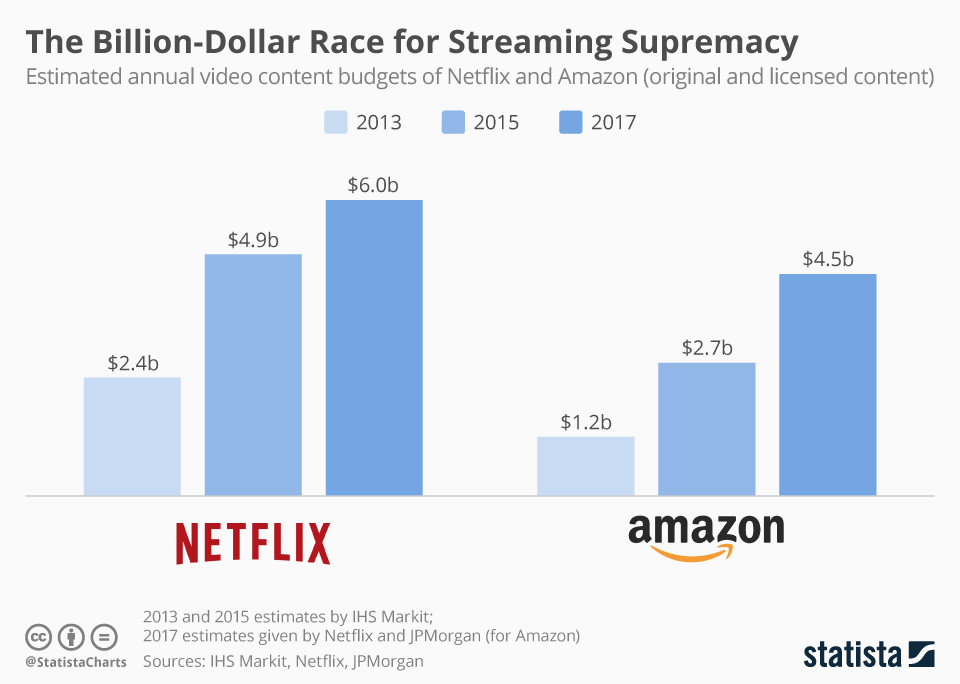 Right now Netflix and Amazon are locked in a race for viewer eyeballs, having spent $10 Billion on original content between themselves. It got me thinking if tech is going to drive a dramatic shift in how the entertainment industry operates.
Right now Netflix and Amazon are locked in a race for viewer eyeballs, having spent $10 Billion on original content between themselves. It got me thinking if tech is going to drive a dramatic shift in how the entertainment industry operates.
Questions I sought to answer were:
- Could technology/the internet upend the existing models like it did for the newspapers which are shutting down, laying off staff or moving to online subscriptions?
- Who would win this battle? But first, some anarcho-communist cypherpunk nostalgia. If you were around on the internet in the early 2000’s, you’d recall how the entertainment industry (movies + TV shows) viewed piracy as big threat; access to movies for free was viewed as bringing about the end of the movie-business. Numerous groups would take pride in competing to release the first and/or the best “RIP” of a movie online via torrents. This was great freedom, but the free as in free beer kind. Movie studious and the RIAA got shit-serious about piracy, suing all and sundry, putting people in jail and blocking access to torrent websites at the ISP/DNS level. Simultaneously, online streaming started to catch on as internet speeds improved. But with the benefit of hindsight, we see that the entertainment industry largely adapted to this transition, with internet-streaming becoming a popular mode of consumption. Piracy became redundant as legal streaming became super-convenient. Netflix went from renting DVDs to a streaming only model with a flat monthly subscription.A early mover in the market and a late response from it’s competitors meant Netflix became synonymous with the streaming industry.Today, in the USA, there are more households with Netflix than Cable television. But Netflix, despite being an internet-enabled/technology company does not operate differently from a typical studio. While Netflix started off by licensing content from other studios/production houses merely serving as a distribution platform, since 2013 it has focused heavily on producing its own content. This makes complete sense from a financial perspective and is a classic case of backward integration. Licensing deals are temporary and bear ever-increasing costs while original content is forever; also providing an additional revenue source if licensed to other players. But Netflix produces its shows just like any other TV network, working with studios/production/media companies to commission shows. A few key differences being it’s commitment to more seasons, paying upfront and giving the makers more creative freedom over their work . So the underlying structure of the TV show business remains the same. However, there are some interesting implications, since Netflix earns via subscription fees and not via advertising they have much less propensity to produce simultaneously watched mass content which which will bring in hordes of eyeballs and rakes in advertising dollars . This allows them to produce and serve more niche content and arguably, content of higher quality.
While you can upload your fail videos or stand-up comedy to YouTube and make some good cash, what Netflix chases is high production value professionally-developed content. While a whole new segment has emerged based on Youtube content, the TV business remains largely untouched, in fact people continue to spend most of their time watching TV. So that settles question 1. What about 2? Who wins this war? I found the answer in a report by Deloitte
As boundaries blur, differentiation is focusing increasingly on content, which is the current basis of competition for most players in the television space.
Yet again, whoever has the best rights wins but as no single company owns all the rights, there will be several different winners. For the streaming business, content is effectively a commodity. Unlike a social network or search engine, the best content
- Keeps emerging
- Is subjectively defined
- Is highly localised
- Can be produced/acquired/licensed by spending capital So while good content is necessary to survive in market; all players may have some of it, no one will have all of it; and multiple winners emerge. No winner take all effects here. References: 1. Article on decline of torrents 2. Article about the underlying structure of the TV business

